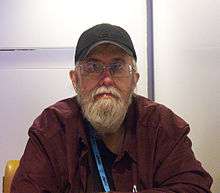Lucius Shepard (21 August 1943 – 18 March 2014) was an American writer. Classified as a science fiction and fantasy writer, he often leaned into other genres, such as magical realism.
Quotes
Green Eyes (1984)

The necessary had been accomplished. That’s the way Les Invisibles work. Singular, unquantifiable events. Impossible to treat statistically, to define with theory.
- All page numbers are from the mass market paperback edition published by Ace ISBN 0-441-30274-2, December 1990 printing
- Nominated for the 1985 John W. Campbell Award, the 1987 Arthur C. Clarke Award, the 1984 Philip K. Dick Award, and the 1985 Locus Award for Best Science Fiction Novel
- I submit that all psychotherapy is manipulation; that as psychiatrists we do not heal people, but manipulate their neuroses into functional modes.
- Chapter 6, p. 46
- Manipulate? Yes, I manipulated. And despite the ensuing events, I would do so again, for it is the function of psychiatry to encourage the living to live.
- Chapter 6, p. 49
- We uncovered new forces, we took a step along what may be an endless path toward divinity, we redirected the entire thrust of psychoanalytic theory, and, as with all knowledge, we found that deeper and more compelling mysteries yet lay beyond those we had reduced to the security of fact.
- Chapter 6, p. 51
- “And then along came Satan’s Eye Itself. Television.” He laughed, as at some fatal irony. “Don’t you hear the evil hum of the word, the knell of Satan? Television! It’s the ruling character of your lives, like the moon must have been for Indians. An oracle, a companion, a signal of the changing seasons. But rather than divine illumination, each night it spews forth Satan’s imagery. Murders, car crashes, mad policemen, perverted strangers! And you lie there decomposing in its flickering, blue-gray light, absorbing His horrid fantasies!”
- Chapter 10, p. 115
- Overwhelmed with disgust, Donnell said, “I could sell you sorry fuckers anything, couldn’t I?”
They weren’t sure they had heard correctly; they looked at each other, puzzled, asking what had been said.
“I could sell you sorry fuckers anything,” he repeated, “as long as it had a bright package and was wrapped around a chewy nugget of fear. I could be your green-eyed king. But it would bore me to be the salvation of cattle like you. Take my advice, though. Don’t buy the crap that’s slung into your faces by two-bit wart-healers!” He jabbed his cane at Papa Salvatino, who stood open-mouthed in the aisle, a litter of paper cups and fans and Bibles spreading out from his feet. “Find your own answers, your own salvation. If you can’t do that,” said Donnell, “then to Hell with you.”- Chapter 10, p. 118
- The necessary had been accomplished. That’s the way Les Invisibles work. Singular, unquantifiable events. Impossible to treat statistically, to define with theory.
- Chapter 14, p. 184
- The half moon sailed high, sharp-winged shadows skimming across it, and the conical hills and the vine-shrouded trees washed silver-green under the moonlight had the look of a decaying city millennia after a great catastrophe.
- Chapter 15, p. 192
- It was easy to see how one could think of the family as a single terrible creature stretching back through time, some genetic flaw or chemical magic binding the spirit to the blood.
- Chapter 15, p. 201
- “An attic’s the afterlife of a house,” said Otille, opening the door. “Or so my mother used to say.”
- Chapter 15, p. 201
- Every object, the old man had said, is but an interpretation of every other object. There is no sure knowledge, only endless process.
- Chapter 17, p. 239
- The outcry surrounding the public disclosure of the project had taken only three months to die, this—thought Jocundra—a telling commentary upon the spongelike capacity of the American consciousness to absorb miracles, digest them along with the ordinary whey provided by the media, and reduce them to half-remembered trivia.
- Epilogue, p. 271
- “It’s not hope,” said Jocundra. “It’s just confusion. I know he’s dead.”
“Sure it’s hope,” said Mr. Brisbeau. “Me, I ain’t no genius, but I can tell you ‘bout hope. When my boy he’s missin’ in action, I live wit hope for ten damn years. It’s the cruelest thing in the world. If it get a hook in you, maybe it never let you go no matter how hopeless things really is.” He closed up the sack and laughed. “I remember what my grand-mère used to say ’round breakfas’ time. My brother John he’s always after her to fix pancakes. Firs’ ting ever’ mornin’ he say, ‘Well, I hope we’re goin’ to have pancakes.’ And my grand-mère she tell him jus’ be glad his belly’s full, him, and then she say, ‘You keep your hope for tomorrow, boy, ’cause we got grits for today.’” He stood and shouldered the sack. “Maybe that’s all there is to some kinds of hopin’. It makes them grits go down easier.”- Epilogue, p. 274
A Walk in the Garden (2003)
External links
- Lucius Shepard at the Internet Speculative Fiction Database
- A more complete bibliography
- Golden Gryphon Press official site - About Louisiana Breakdown
- Golden Gryphon Press official site - About Two Trains Running
- Golden Gryphon Press official site - About The Golden (trade paperback reprint)
- Works available online
- "Abimagique"
- "A Walk in the Garden"
- "AZTECHS"
- "Emerald Street Expansions"
- "The Emperor"
- "The Jaguar Hunter"
- "Jailwise"
- "Liar's House"
- "The Night of White Bhairab"
- "Over Yonder"
- "Senor Volto"
This article is issued from
Wikiquote.
The text is licensed under Creative
Commons - Attribution - Sharealike.
Additional terms may apply for the media files.
